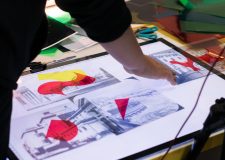Brighton university scientists to showcase marine research at Sea Life Centre
Scientists at Brighton University are leading a €2m study of marine life.
Their aim is to develop new ways to fight infections, regenerate damaged skin and combat pollution.
The research will identify, isolate and collect marine biomolecules that could bring medical benefits in the future.
They will showcase their research at a free public event at the Sea Life Centre, Brighton, on Thursday evening next week (27 February).
The Sea Life Centre reopened today (Monday 17 February) after flooding forced it to close at the weekend.
The research project – BioCare Marine – is part-funded by the European Union through its Interreg IVA 2 Seas Programme which supports economic and social cohesion projects throughout the EU.
The key aims involve trying to generate medical and economic benefits although protecting the marine environment will be an important part of the research.
The Biocare Marine consortium brings together Brighton University, Gent University, in Belgium, the French research institute Ifremer and the French biotech research company Polymaris.
Lead scientist Dr Iain Allan, senior research fellow at Brighton University’s School of Pharmacy and Biomolecular Sciences, said: “Marine creatures have to compete for space and resources in order to survive.
“Marine bacteria, like those from other environments, try to out-compete their neighbours using a number of tactics, including the use of what are essentially chemical weapons – some of which we know as antibiotics.
“Biocare Marine is trying to find new antimicrobial agents that are naturally produced by marine bacteria.
“This comes at a time when many disease-causing bacteria are developing resistance to the current generation of antibiotics.
“We are also using marine-derived polymers to construct biomaterials that can be used as the structural components of tissue regeneration matrices.
“We are aiming to improve on current materials and be more economical.
“This work could have benefits for the fishing industry through added value of waste materials, such as fish scales and bones, the derivatives of which form the basis of some of our biomaterials.”
Dr Cressida Bowyer, a researcher on the project, said: “We are looking to nature to provide solutions to scientific problems.
“For example, marine bacteria have evolved coatings to bind toxic heavy metals which would otherwise penetrate and poison them.
“We are attempting to exploit this defence mechanism by synthesising filtration matrices that are coated with these bacterial polymers.
“We could then use them to purify fluids that have been contaminated with these toxic metals.”
Next Thursday the guest speaker will be Anthony Metcalfe, professor of burns and wounds at Brighton University and director of research at the Blond McIndoe Research Foundation.
And there will be music from former Marillion front man Fish, now a solo artists. He has a keen interest in marine science.
There will also be a question-and-answer sessions for the public to learn more about the research.
For tickets, click here.






















